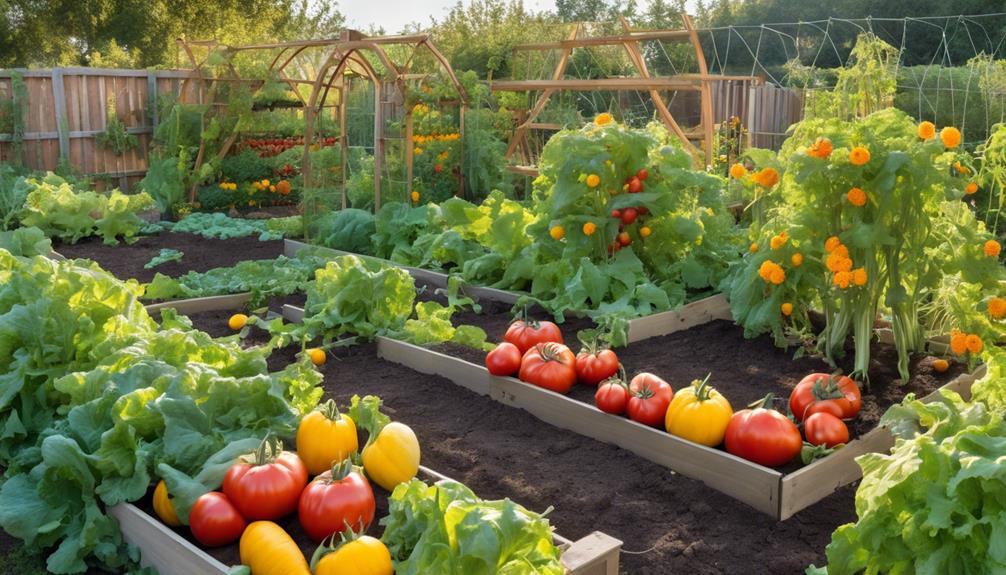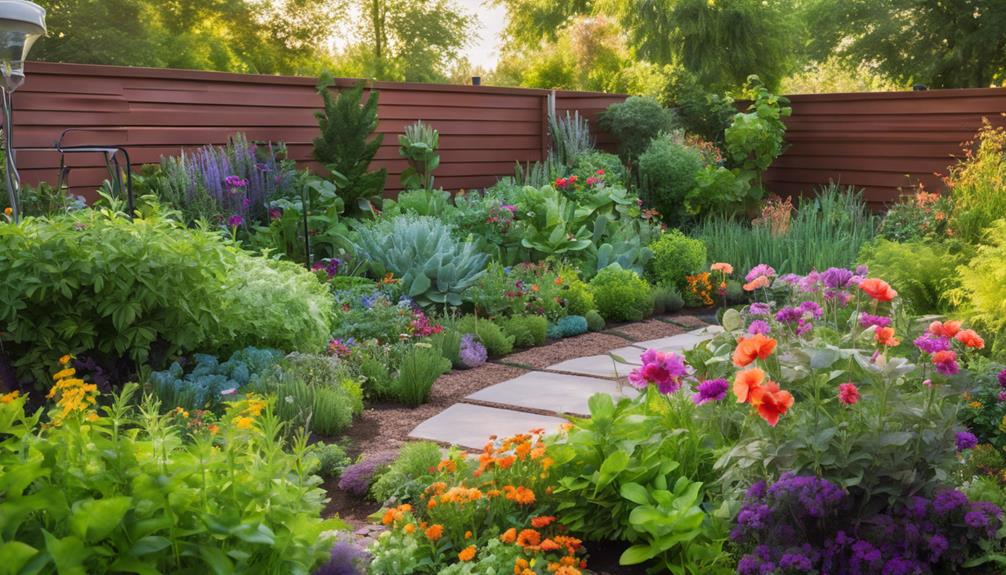
Find Local Pros for Your Seasonal Garden Cleanup
21 January 2025What Fertilizer Should You Use for New Turf?
21 January 2025Regular garden maintenance is essential for several reasons.
Firstly, it ensures healthier plants by providing ideal conditions through proper watering, soil amendments, and timely interventions.
Furthermore, routine upkeep acts as a barrier against pest infestations, minimising their impact on plant vitality.
Ultimately, maintaining a garden greatly enhances mental well-being; gardening activities promote relaxation and elevate mood.
By keeping your garden in top shape, you create a vibrant ecosystem that supports both plant health and personal satisfaction.
Discover additional insights on effective gardening practices and enhance the success of your outdoor space.
Importance of Regular Upkeep
Regular upkeep of your garden is crucial for fostering healthier plants, as consistent attention to their needs promotes robust growth and vitality.
Furthermore, routine maintenance acts as a proactive measure against pest infestations, reducing the likelihood of damage to your plants.
Healthier Plants Thrive
Consistent maintenance is crucial for cultivating healthier plants in any garden. Regular upkeep, including watering, pruning, and soil amendment, ensures that plants receive the necessary nutrients and conditions for optimal growth.
By routinely assessing the health of your plants, you can identify deficiencies or imbalances early, allowing for timely interventions that promote vigour. Additionally, maintaining a clean garden environment minimises competition for resources and fosters a conducive atmosphere for plant development.
Healthy plants exhibit improved resistance to environmental stressors and typically yield higher productivity, whether that be in blooms or fruits. Consequently, committing to a disciplined maintenance routine not only enhances aesthetic appeal but also greatly contributes to the overall vitality and resilience of your garden ecosystem.
Prevents Pest Infestations
A well-maintained garden serves as a formidable barrier against pest infestations, significantly reducing the likelihood of unwanted creatures wreaking havoc on your plants.
Regular upkeep, including weeding, pruning, and mulching, not only enhances the aesthetic appeal of your garden but also minimises habitats conducive to pests. Healthy plants, nurtured through consistent care, are more resilient to infestations, making them less attractive to harmful insects.
Additionally, the timely removal of decaying organic matter eliminates breeding grounds for pests. Integrated pest management strategies, combined with routine inspections, enable early detection and intervention, ensuring that pest populations remain manageable.
Garden Health and Sustainability
Ensuring garden health and sustainability requires a comprehensive approach that includes maintaining soil nutrient balance, effective pest and weed management, and fostering biodiversity.
Each of these elements plays an essential role in creating a thriving ecosystem that supports plant growth while minimising environmental impact.
Soil Nutrient Balance
Soil nutrient balance is a critical component of garden health and sustainability, serving as the foundation for robust plant growth and ecosystem resilience.
Achieving an ideal nutrient balance involves understanding the crucial elements required by plants and the interactions within the soil ecosystem. Regular maintenance practices can greatly enhance this balance, promoting healthier crops and reducing the need for synthetic fertilisers.
- Guarantees an adequate supply of macronutrients (N, P, K)
- Facilitates micronutrient availability for metabolic functions
- Promotes beneficial microbial activity in the soil
- Improves water retention and soil structure
Pest and Weed Management
Maintaining a balanced soil nutrient profile plays a crucial role in supporting healthy plant growth, which in turn aids in the effective management of pests and weeds.
When plants thrive, they are more resilient to infestations and competition for resources. Regular garden maintenance ensures that both pests and weeds are kept in check, contributing to overall garden health.
- Implementing crop rotation to disrupt pest life cycles.
- Utilising mulching techniques to suppress weed emergence.
- Encouraging beneficial insects that prey on harmful pests.
- Monitoring soil moisture levels to prevent weed establishment.
Biodiversity and Ecosystem Balance
Biodiversity serves as the foundation for a resilient garden ecosystem, fostering a balance that enhances health and sustainability.
By maintaining a diverse array of plants, beneficial insects, and microorganisms, gardeners can improve their garden's overall vigour. This multifaceted approach not only supports individual species but also promotes the intricate relationships that sustain the ecosystem.
Key benefits of biodiversity in the garden include:
- Improved Pollination: A variety of flowering plants attracts diverse pollinators, enhancing fruit and seed production.
- Soil Health: Diverse root systems and organic matter support nutrient cycling and soil structure.
- Pest Control: A mix of plant species can deter pests and promote natural predators.
- Resilience: Biodiverse gardens are better equipped to withstand environmental changes and diseases.
Gardening Tools and Equipment
Effective gardening hinges on the proper selection and use of tools and equipment that are crucial for soil preparation, moisture retention through mulching, and implementing companion planting strategies.
Understanding how each tool contributes to these practices can considerably enhance your garden's overall health and productivity.
As we explore these elements, we will outline the specific tools that can optimise your gardening efforts.
Soil Preparation Essentials
Proper soil preparation is fundamental to successful gardening, requiring essential tools and equipment that enhance both efficiency and effectiveness.
Mastery of soil preparation begins with selecting the right implements, ensuring ideal conditions for plant growth. The following tools are indispensable:
- Garden Fork: Aerates the soil and breaks up compacted areas.
- Rototiller: Efficiently mixes soil amendments and loosens the soil structure.
- Soil Test Kit: Assesses pH and nutrient levels, guiding amendment decisions.
- Rake: Smooths and levels soil, creating a uniform planting surface.
Utilising these tools improves soil texture, promotes drainage, and fosters a healthy ecosystem, ultimately leading to flourishing plants.
Investing time and resources in proper soil preparation lays the foundation for gardening success.
Mulching for Moisture Retention
After establishing a solid foundation through soil preparation, the next step in maintaining a thriving garden involves mulching, a practice that significantly improves moisture retention.
By applying a layer of organic or inorganic materials to the soil surface, gardeners can effectively minimise evaporation and ensure plants remain hydrated.
Consider the following benefits of mulching for moisture retention:
- Reduction in Watering Frequency: Less evaporation means you can water less often.
- Temperature Regulation: Mulch insulates the soil, keeping it cool in summer and warm in winter.
- Weed Suppression: A thick mulch layer inhibits weed growth, reducing competition for moisture.
- Soil Structure Improvement: Organic mulches break down over time, enriching the soil and further enhancing moisture retention.
Implementing mulching techniques is vital for optimal garden health.
Companion Planting Strategies
Harnessing the power of companion planting can significantly improve the productivity and health of your garden. This strategic approach involves cultivating different plants in proximity to boost growth, deter pests, and optimise space.
Mastering companion planting requires understanding which plants benefit from one another. Consider the following strategies:
- Pest Management: Utilise plants like marigolds to naturally repel harmful insects.
- Nutrient Sharing: Pair legumes with heavy feeders such as corn to enhance soil fertility.
- Microclimate Creation: Use taller plants to provide shade for more delicate varieties, fostering diverse growth.
- Pollinator Attraction: Incorporate flowering plants to attract beneficial pollinators, thereby boosting fruit and seed production.
Improved Mental Well-Being
Engaging in regular gardening activities not only nurtures plants but also fosters significant improvements in mental well-being. Scientific research underscores the therapeutic effects of gardening, highlighting its ability to reduce stress, enhance mood, and promote a sense of accomplishment. Furthermore, the act of tending to a garden encourages mindfulness, allowing individuals to immerse themselves in the present moment.
| Benefit | Description | Impact |
|---|---|---|
| Stress Reduction | Engaging with nature lowers cortisol levels. | Promotes relaxation |
| Mood Enhancement | Exposure to sunlight and greenery elevates serotonin. | Increases happiness |
| Sense of Accomplishment | Completing garden tasks instils pride. | Fosters self-esteem |
Integrating these practices into your routine can yield profound benefits for your mental health.
Professional Garden Design Services
Professional garden design services offer invaluable expertise in seasonal colour planning, ensuring that your garden remains vibrant throughout the year.
These services also encompass effective seasonal planting techniques tailored to your specific climate and soil conditions.
Furthermore, regular seasonal plant health assessments are essential for maintaining the longevity and beauty of your garden.
Seasonal Color Planning
In relation to creating a vibrant and dynamic garden, seasonal colour planning is vital for achieving a visually appealing landscape throughout the year. This meticulous approach guarantees that your garden exhibits an ever-changing palette, reflecting the beauty of each season.
To master seasonal colour planning, consider the following elements:
- Diverse Plant Selection: Incorporate a variety of plants that bloom in different seasons to maintain interest.
- Colour Schemes: Utilise complementary and contrasting colours to improve visual impact and harmony.
- Focal Points: Designate specific areas with bold colours or unique textures to draw attention and create depth.
- Seasonal Shifts: Plan for smooth transitions between seasons, ensuring a seamless flow of colour and texture.
With strategic seasonal colour planning, your garden will consistently inspire admiration.
Seasonal Planting Techniques
To achieve a thriving garden that reflects the beauty of each season, employing effective seasonal planting techniques is essential.
Mastering these techniques enables gardeners to maximise growth, improve aesthetics, and guarantee sustainability throughout the year.
Consider the following strategies:
- Crop Rotation: Prevent soil depletion and reduce pest infestations by alternating plant families each season.
- Companion Planting: Pair plants that mutually benefit each other, enhancing growth and resilience.
- Layering Techniques: Utilise vertical space by planting taller varieties behind shorter ones, maximising sunlight exposure.
- Seasonal Timing: Understand local climate patterns to plant at the optimal time for each species, ensuring robust development.
Seasonal Plant Health Assessments
Conducting seasonal plant health assessments is crucial for maintaining a vibrant and resilient garden.
These assessments provide critical insights into the overall condition of your plants and enable proactive care strategies tailored to specific seasonal challenges.
Key aspects to evaluate during these assessments include:
- Soil Quality: Assess nutrient levels and pH balance to ensure ideal growth conditions.
- Pest and Disease Monitoring: Identify early signs of infestations or diseases to mitigate damage effectively.
- Watering Needs: Evaluate moisture levels, adjusting irrigation practices to prevent both drought stress and root rot.
- Growth Patterns: Observe plant development to inform pruning and fertilisation schedules.
Weather-Related Gardening Issues
Weather-related challenges can significantly impact garden health, necessitating a strategic approach to plant selection and irrigation.
Choosing drought-resistant plants is crucial for sustainability, while the proper installation of irrigation systems and timely adjustments ensure ideal water management during varying weather conditions.
Addressing these factors can help maintain a thriving garden, regardless of external climate fluctuations.
Drought-Resistant Plant Selection
Selecting drought-resistant plants is vital for maintaining a resilient garden in the face of increasingly erratic weather patterns.
These plants are specifically adapted to thrive in low-water conditions, minimising the need for supplemental irrigation and ensuring the longevity of your garden.
By incorporating such species, you not only conserve water but also create a sustainable ecosystem.
Consider the following benefits of drought-resistant plants:
- Lower Water Usage: Significant reduction in water consumption.
- Enhanced Soil Health: Improved soil structure through deep-root systems.
- Increased Biodiversity: Support for a wider range of wildlife and pollinators.
- Aesthetic Appeal: Diverse textures and colours that enrich your garden's visual impact.
Embracing drought-resistant selections is an important strategy for effective garden management.
Irrigation System Installation Tips
Installing an effective irrigation system is crucial for maintaining a healthy garden, especially in the face of unpredictable weather patterns.
A well-planned irrigation system not only conserves water but also ensures that your plants receive the ideal moisture they require.
Here are key tips to consider during installation:
- Assess Water Source: Identify the most reliable water source, whether it is a municipal supply, well, or rainwater collection.
- Plan Layout: Design a layout that accommodates different plant types, ensuring even water distribution.
- Choose the Right System: Consider drip irrigation for targeted watering or sprinkler systems for broader coverage.
- Install Timers and Sensors: Incorporate timers and soil moisture sensors to automate watering schedules and minimise wastage.
Irrigation System Adjustments Needed
Adapting your irrigation system to changing weather conditions is vital for sustaining plant health and optimising water usage.
Regular evaluations and adjustments ensure your garden thrives despite environmental fluctuations.
Consider the following important adjustments:
- Seasonal Schedule Changes: Modify watering frequency based on seasonal rainfall and temperature variations.
- Soil Moisture Monitoring: Implement sensors to gauge soil moisture, allowing for data-driven irrigation.
- Sprinkler Head Adjustments: Realign or replace sprinkler heads to ensure even coverage and avoid water wastage.
- System Maintenance: Regularly inspect for leaks or blockages to maintain efficiency and functionality.
Why Choose TKL Birmingham Gardener
When it comes to selecting a gardener in Birmingham, TKL emerges as a premier choice for a variety of reasons.
Their team of highly skilled professionals possesses extensive knowledge in horticulture, ensuring that your garden receives expert care tailored to its specific requirements.
TKL employs sustainable practices that promote ecological balance while enhancing the visual appeal of your outdoor space.
Their commitment to customer satisfaction is evident through personalised service, diligent communication, and meticulous attention to detail.
Furthermore, TKL utilises state-of-the-art equipment and innovative techniques to optimise efficiency and effectiveness in garden maintenance.
Common Gardening Mistakes Explained
Many gardeners, whether novice or experienced, often fall prey to common mistakes that can hinder the health and beauty of their plants.
Overwatering is a frequent issue, leading to root rot and diminished growth; it is vital to understand the specific needs of each plant.
In addition, neglecting soil quality can stunt development; regular testing and amendment of soil pH and nutrients are fundamental for ideal growth.
Planting too closely can also restrict air circulation and promote disease.
Moreover, failing to take into account sunlight requirements may result in poor plant performance.
Lastly, improper pruning techniques can damage or disfigure plants, inhibiting their natural shape and health.
Plan for Seasonal Transitions
To successfully maintain a vibrant garden throughout the year, it is essential to plan for seasonal changes. A proactive approach enables you to adapt your gardening practices to fluctuating weather conditions, ensuring optimal plant health and aesthetic appeal.
Consider the following strategies for effective seasonal transitions:
- Soil Preparation: Test and amend soil to meet the needs of forthcoming crops.
- Plant Selection: Choose varieties that thrive in your specific climate and season.
- Pest Management: Implement integrated pest management strategies tailored to seasonal infestations.
- Watering Techniques: Adjust irrigation schedules based on seasonal rainfall and temperature variations.




